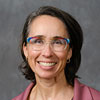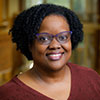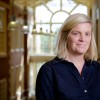For three years, the Wake Forest LEAP Internship Program has been grooming Winston-Salem Forsyth County high school students for careers in STEM disciplines through hands-on laboratory experience while also enhancing their academic and professional acumen. As the program continues to grow, it aims to cultivate the education-career pathways of underrepresented students interested in STEM professions.
This summer, 23 students – nearly double the program’s initial capacity – were assigned to one of WFU host labs in the Biology, Chemistry, Computer Science, Health and Exercise Science, and Physics departments. Along with WFU lab faculty, LEAP program mentors – other faculty, graduates, and undergraduates – assisted students relative to lab etiquette and research foundations while supporting them through a research project over six weeks. ZSR librarians have the privilege of meeting LEAP students each year for library tours and instructional sessions.
ZSR Instruction
On Monday, June 17th, Rebecca led LEAP students on a campus and ZSR tour. Rebecca met them in the Pit and began a hot but brisk walk around campus pointing out science buildings along with other campus highlights available to them during their internship. In ZSR, Rebecca pointed out spaces and places that would be helpful to their internship while gaining a sense of belonging on campus and in the library. The tour rounded off in Special Collections & Archives allowing them to see some of our historic STEM-based collections. It was great to cover so much literal ground with the LEAPers and seeing them use the library during their internship.
Colleen and Denice then facilitated a 2-hour instructional session on Tuesday, July 2nd. Colleen’s goal was to help students learn how to develop a research question and then translate that question into a search string. She focused on Boolean operators and search tools available on the ZSR website and in the Web of Science collection of databases. Colleen integrated interactive activities where students immediately practiced the knowledge she conveyed based on their research topic. Denice wanted to ensure students knew how to fine tune their search strategy by supporting them through selecting appropriate databases. In addition, Denice reviewed other websites outside of databases such as lens.org ResearchRabbit WorldCat, and Google Books leading them through an exercise in selecting the appropriate option according to their project. Lastly, where would a library session be without an AI discussion – and one led by Denice?! Denice gave an overview of scite.ai available through ZSR’s site license and other free AI tools.
LEAP Symposium
On Friday, July 26, the LEAP Symposium offered a platform for students to present their projects to family, peers, and mentors. Project content ranged from marine water viral activity and implications to carbon dots in lime peels and pulp to the functional diversity of ribosomal protein paralogs. Each student gave a short introduction about themselves and their project while welcoming the audience to visit their poster and demonstrations afterwards. The gratitude was flowing from each intern towards the program and their mentors and peers as well as evidence of the auspicious traits of self-awareness and efficacy in young adults.
Alana James, Wake Downtown director, along with the other LEAP coordinators and mentors deserve a big round of applause for this program’s continued success and the level of commitment and engagement with these rising researchers in STEM fields.



6 Comments on ‘LEAP Program Incorporates ZSR Instruction (Again)!’
This is a wonderful initiative!!!!! Thank you for putting it together.
Thanks for the update, so glad to see SCA STEM collections included!
LEAP is such a great program and it’s wonderful to have ZSR involved. Thanks y’all!
Hooray for ZSR helping to support this fantastic program!
Congratulations for continuing and supporting this promising and I am sure valuable internship program.
What a cool partnership! Congrats to everyone involved!